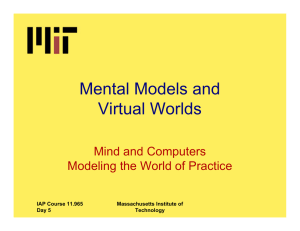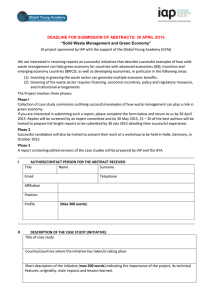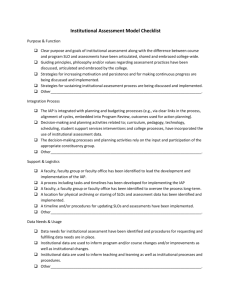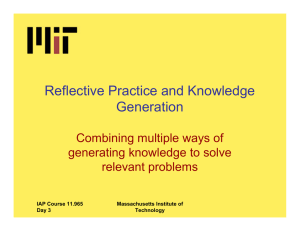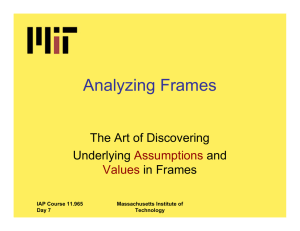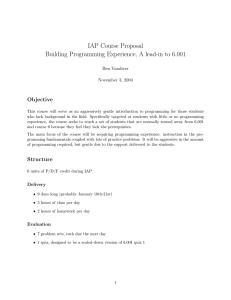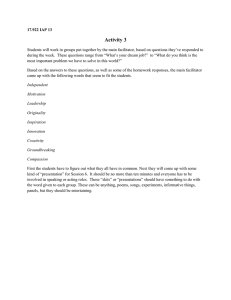Conceptual Innovation Seeing farther, understanding deeper,
advertisement
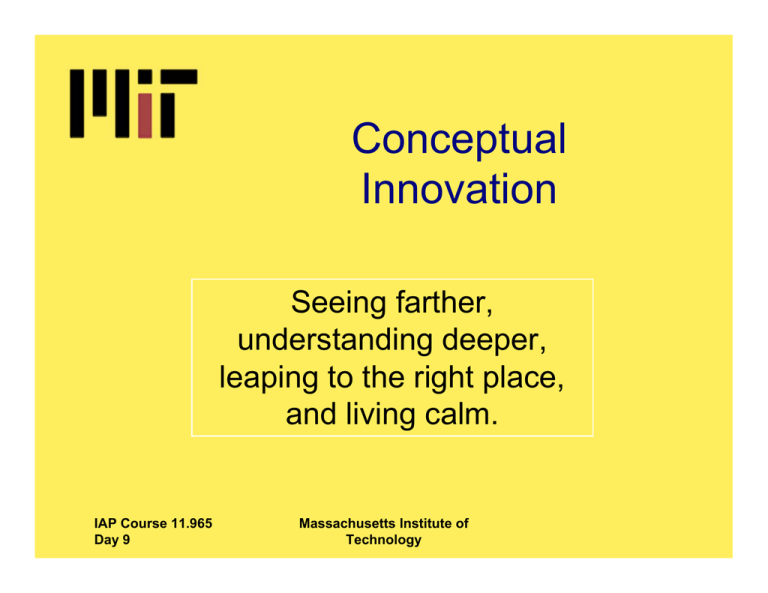
Conceptual Innovation Seeing farther, understanding deeper, leaping to the right place, and living calm. IAP Course 11.965 Day 9 Massachusetts Institute of Technology Evolving through Conceptual Innovation • It is not a question of: – – – – – Running faster. Working harder. Getting more resources. It is not about being stronger. Modernizing our portfolio of methods and tools. • It is more like – Rethinking what we already know. – Renewing the concepts we use for understanding. – Getting wiser. IAP Course 11.965 Day 9 Massachusetts Institute of Technology Technical and Conceptual Learning • We are more trained in learning new methods and techniques than for learning new concepts. • One reason for that is that new methods impact on productivity almost immediately. • But limiting our learning to technical issues: – We are not enough flexible before complex situations – We and our techniques get out of date in a short period of time – We get over-learned in a few years, our curiosity decreases. – Our brain tends to get older faster. IAP Course 11.965 Day 9 Massachusetts Institute of Technology Concept Is a Shorthand for Learning • According to Dewey, Schön and others, concepts are cognitive “tools for coping with the world, for solving problems.”* • Examples: – – – – A child’s first notion of his mother, Our notion of the cold war,… The Newtonian theory of light, and The idea of a new mechanical fastener.”* *Donald Schön, Displacement of Concepts,1963 IAP Course 11.965 Day 9 Massachusetts Institute of Technology Concepts and Frames • “There are no things without concepts”. • “It is only by a process of abstraction that we distinguish concept-tools and the situations in which they are used”. • “While a given situation can be conceived in a variety of ways, it is always a conceptstructured situation”. (Donald Schön, Displacement of Concepts,1963) • Concepts determine the way a situation is perceived and framed. IAP Course 11.965 Day 9 Massachusetts Institute of Technology We see a small part of what we are looking at Reality Concepts: Enable Perception and Understanding The elements of reality that are not perceived are noise. IAP Course 11.965 Day 9 Massachusetts Institute of Technology Sense Making Elements of reality that are perceived New Realities, Old Concepts and New Concepts • Every time we deal with new situations we try to make sense of them based on our portfolio of (old) concepts. • Once we detected that something is new, we try to make sense of it by making analogies with others things we already know. We do that by using old concepts and bringing back our past experiences. • Gradually we go through the process of extending and changing the old concepts, and in some moment a new concept emerges. IAP Course 11.965 Day 9 Massachusetts Institute of Technology New Concepts and Old Knowledge • The interaction with new concepts triggers learning processes: – The assimilation/incorporation of new concepts disturbs and transforms the knowledge we have about the world and ourselves. – The emergence of new concepts change the way we perceive and understand the world. • New concepts emerge as new questions are made. • Conceptual innovation is like reframing, but deeper. IAP Course 11.965 Day 9 Massachusetts Institute of Technology Conceptual Innovation and Reframing • Reframing is a way of: – Improving our understanding of a situation, – Solving conflicts, and – Inventing new strategies. • Conceptual Innovation enable to rethink a whole group of situations • It brings up a new set possibilities IAP Course 11.965 Day 9 Massachusetts Institute of Technology Paradigm Shift A paradigm shift brings a new set of concepts: – – – – – From things to people From product to process From beneficiary to citizen From teacher to coach From standardizing to managing diversity – From replication to inspiration – From controlling to managing the emergence. Etc. IAP Course 11.965 Day 9 Robert Chambers talking on paradigm shift in the HQ of CARE-USA, 2004 Massachusetts Institute of Technology “New” Concepts, presented in the Course on Reflective Practice • • • • • Reflective practice Reframing Assumptions Mental model Theories of Action – Espoused theories – Theories-in-use • Reflection • Conceptual Learning IAP Course 11.965 Day 9 Massachusetts Institute of Technology
